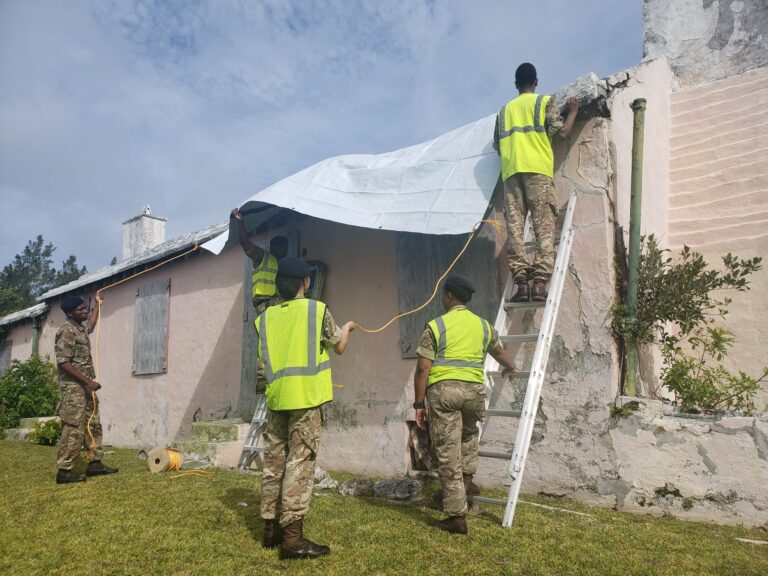While the members of the Royal Bermuda Regiment are much more than just hurricane cleanup personnel, they are the experts at it. Royal Bermuda Regiment (RBR) soldiers are often first on the scene to clear the road and even secure our buildings – how do they prepare and mobilise for a hurricane?
Speaking with Major Duncan E R Simons, public relations officer, we got an in-depth look at what it takes to be prepared for this kind of national emergency. I had the opportunity to visit their training sites and observe how they are preparing for hurricane season even now by cutting back casuarina trees, getting some chainsaw experience in, mobilising into teams, and more.
When it comes to training and preparation to best handle a hurricane emergency, Major Simons explained that post-hurricane restoration is a coordinated effort between the Regiment and the wider emergency services community.
“For the Regiment, that effort is led by B Company,” he shared, “which has a remit of humanitarian aid and disaster response.
“In Bermuda, after a hurricane, the immediate challenge is ensuring our roads are passable. This involves using chainsaws to remove fallen trees along pre-determined routes to allow for the movement of emergency vehicles. Once that is complete, they action other tasks coordinated by the Emergency Measures Organisation.
“We organise ourselves into Immediate Response Teams (IRTs). Each IRT has up to 30 soldiers assigned to it. Key people include commanders, medics, signallers and chainsaw operators.”
“The IRTs have predetermined routes or areas of responsibility. For example, IRT 1 is assigned to St George’s. It will deploy across the Causeway before a storm and includes boats from the Coast Guard Unit.
“Everyone else is based out of Warwick Camp except, of course, the Coast Guard Unit which is based on Watford Island in Sandys. They pull their boats before storms arrive and they are back in the water at the earliest opportunity to conduct inspections, and search and rescue operations if required.”
To prepare for hurricane season, B Company runs an annual exercise in May of each year. “This involves reviewing our operational order in line with our Disaster Management Plan and setting up our Ops room and running it through an exercise scenario to remind key participants in our response of the standard procedures,” Major Simons explained.
It also means practising building shoring and allowing for enough time for soldiers to get chainsaw time. The RBR also invites the Occupational Health and Safety team from BELCO into
Warwick Camp to remind the soldiers of the risk and procedures around dealing with downed power lines.
Operating a chainsaw is as dangerous as operating a firearm, so it important that the RBR facilitates training for chainsaw operators. Many of the soldiers now hold City and Guilds qualifications in chainsaw operation. Those who have not yet completed the qualification will have undergone an internal training programme and are authorised by the Commanding Officer annually after annual refresher training.
“Over the coming two years, all of our operators will be City and Guilds qualified,” Major Simons assured.
The other component is inspecting all their kit and equipment to ensure it is operational. The Quartermaster and CO inspect the hurricane stores.
Another key part is confirming who is playing what role during a storm and making sure that contact information is current. Manning lists are constantly under review during hurricane season to avoid delays when soliders are called up.
When asked if there any other specific qualifications that are obtained by the RBR members, Major Simons delves further, “Our medics are trained to Emergency Medical Responder (EMR) or higher and most will have completed basic Combat Medic training. All Coast Guard personnel will have completed RYA (Royal Yachting Association) qualifications and have completed the equivalent of Bermuda’s marine pilot exams.”
Picking up on the idea of local support, the RBR obtains most of its equipment from local vendors and only imports items if they cannot be sourced locally.
If there one thing the RBR would like the public to know when preparing for hurricane season, it would be to take hurricanes seriously and to prepare in advance.
Aware this message can start to sound like a broken record, Major Simons emphasises: “I think as a country we do a respectable job, but we must guard against complacency. To make our job easier, and the job of the utilities easier, if you live on a road or if powerlines pass your property, please put in the effort to clear vegetation overhanging roads and near powerlines.”
The RBR actively recruits year-round, and it is not just to have more hands on deck when it comes to a national emergency.
“As always, I would encourage everyone in Bermuda to join the Regiment,” Major Simons slips in. “We do so much more than respond to hurricanes. As a military organisation, fundamentally, we are all about building effective teams to take on any task.
“We are a community that offers both lifelong professional and skills development and we will meet you where you are. As a primarily part-time reserve military, our people have the opportunity to develop a career parallel to their primary employment. In my view it is the best second job in Bermuda!”
The Regiment’s next recruit camp starts on July 7. Anyone interested in joining should visit RBR.BM to sign up, or call 238-1045 by the end of June.

